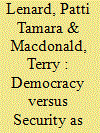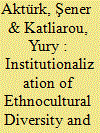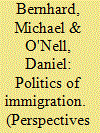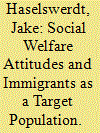|
|
|
Sort Order |
|
|
|
Items / Page
|
|
|
|
|
|
|
| Srl | Item |
| 1 |
ID:
178977


|
|
|
|
|
| Summary/Abstract |
The American public has overwhelmingly supported the Development, Relief, and Education for Alien Minors (DREAM) Act since 2001. The support is widespread and cuts across race, ethnic, and party lines. Given the United States’ anti-immigrant/immigration sentiment in the wake of the September 11, 2001 terrorist attacks, support for the DREAM Act is perplexing. To that end, political scientists, sociologists, and education scholars, among others, have pointed to the exceptional framing of the DREAM Act as the primary predictor of support. However, a significant portion of non-Hispanic white Americans who support the DREAM Act also support restrictive and often punitive immigration policies. What influences most white Americans to support DREAM Act legislation? And what leads a subset of these same individuals to simultaneously support restrictive immigration policies that hurt DREAMers and their families? I argue that predispositions explain these two contradictory policy preferences. Data from the 2012 American National Election Studies (ANES) and the 2018 Cooperative Congressional Election Studies (CCES) demonstrates that white Americans use racial resentment and egalitarianism as justifications to support both policies. However, the effects are conditioned on partisanship.
|
|
|
|
|
|
|
|
|
|
|
|
|
|
|
|
| 2 |
ID:
178974


|
|
|
|
|
| Summary/Abstract |
Democratic citizens confront a range of problems framed as “security” issues, in policy areas such as counterterrorism and migration control, which place substantial political pressure on democratic norms. We develop a normative theoretical framework for assessing whether and how policies that curtail democratic governance standards in the name of security can be justified as politically legitimate. To do so, we articulate a novel normative account of legitimacy, which integrates insights from both democratic and realist traditions of thought to illuminate the complementary contributions of democratic and security standards to political legitimacy. We further elaborate a framework for applying this theoretical account to political practice in the form of a policy-focused “security test” for legitimacy in democratic states. Finally, we explore how this test may be deployed to help resolve policy dilemmas in democratic practice, by examining its application to a case study of national policy on irregular boat arrivals in Australia and Canada. Through this analysis, we contribute to the development of both richer theoretical understandings of the complex modern value of political legitimacy, and clearer action-guiding principles for balancing competing demands of legitimacy within securitized democratic policy regimes.
|
|
|
|
|
|
|
|
|
|
|
|
|
|
|
|
| 3 |
ID:
178980


|
|
|
|
|
| Summary/Abstract |
Public responsiveness to policy is contingent on there being a sufficient amount of clear and accurate information about policy available to citizens. It is of some significance then, that there are increasing concerns about limits being placed on media outlets around the world. We examine the impact of these limits on the public’s ability to respond meaningfully to policy by analyzing cross-national variation in the opinion–policy link. Using new measures on spending preferences from Wave 4 of the Comparative Study of Electoral Systems, merged with OECD data on government spending and Freedom House measures of press freedom, we assess the role of mass media in facilitating public responsiveness. We find evidence that when media are weak, so too is public responsiveness to policy. These results highlight the critical role that accurate, unfettered media can play in modern representative democracy.
|
|
|
|
|
|
|
|
|
|
|
|
|
|
|
|
| 4 |
ID:
178973


|
|
|
|
|
| Summary/Abstract |
The day-to-day behaviors of undocumented immigrants are significantly affected when local law enforcement officials do the work of federal immigration enforcement. One such behavior, which has been widely discussed in debates over so-called sanctuary policies, is that undocumented immigrants are less likely to report crimes to the police when local law enforcement officials work with U.S. Immigration and Customs Enforcement (ICE) on federal immigration enforcement. However, the mechanism that explains this relationship of decreased trust in law enforcement has not yet been systematically tested. Do undocumented immigrants become less trusting of police officers and sheriffs when local law enforcement officials work with ICE on federal immigration enforcement? To answer this, we embedded an experiment that varied the interior immigration enforcement context in a survey (n = 512) drawn from a probability-based sample of undocumented immigrants. When local law enforcement officials work with ICE on federal immigration enforcement, respondents are statistically significantly less likely to say that they trust that police officers and sheriffs will keep them, their families, and their communities safe; will protect the confidentiality of witnesses to crimes even if they are undocumented; will protect the rights of all people equally, including undocumented immigrants; and will protect undocumented immigrants from abuse or discrimination.
|
|
|
|
|
|
|
|
|
|
|
|
|
|
|
|
| 5 |
ID:
178984


|
|
|
|
|
| Summary/Abstract |
Armed conflict creates a context of high uncertainty and risk, where accurate and verifiable information is extremely difficult to find. This is a prime environment for unverified information—rumors—to spread. Meanwhile, there is insufficient understanding of exactly how rumor transmission occurs within conflict zones. I address this with an examination of the mechanisms through which people evaluate new information. Building on findings from research on motivated reasoning, I argue that elite-driven narrative contests—competitions between elites to define how civilians should understand conflict—increase the difficulty of distinguishing fact from fiction. Civilians respond by attempting thorough evaluations of new information that they hope will allow them to distinguish evidence from narratives. These evaluations tend to involve some combination of self-evaluation, evaluation of the source, and collective sense-making. I examine this argument using over 200 interviews with Syrian refugees conducted in Jordan and Turkey. My findings indicate that people are usually unable to effectively distinguish evidence from narratives, so narrative contests are powerful drivers of rumor evaluation. Still, civilian mechanisms of rumor evaluation do constrain what propaganda elites can spread. These findings contribute to research on civil war, narrative formation, and information diffusion.
|
|
|
|
|
|
|
|
|
|
|
|
|
|
|
|
| 6 |
ID:
178975


|
|
|
|
|
| Summary/Abstract |
We seek to explain variation in the descriptive representation of Muslim minorities in national legislatures, relying on an original data set that includes 635 seats filled by Muslim-origin MPs in the lower chambers of national parliaments of twenty-six European polities in three legislative cycles between 2007 and 2018. We argue that the image of a polity as a union of multiple ethnocultural groups, reflected in concrete state policies and institutional arrangements, may be conducive to better descriptive representation of Muslim minorities, who were not originally envisioned as one of the communities constituting the nation. The results of multivariate regression analysis provide support for our hypothesis that the extent to which ethnocultural diversity is recognized and institutionalized helps explain variation in the levels of descriptive representation of European Muslims. We supplement our findings with congruence testing in four brief case studies: Belgium, France, the Netherlands, and Bulgaria.
|
|
|
|
|
|
|
|
|
|
|
|
|
|
|
|
| 7 |
ID:
178983


|
|
|
|
|
| Summary/Abstract |
What are the political consequences of militarizing law enforcement? Across the world, law enforcement has become increasingly militarized over the last three decades, with civilian police operating more like armed forces and soldiers replacing civilian police in law enforcement tasks. Scholarly, policy, and journalistic attention has mostly focused on the first type, but has neglected the study of three main areas toward which we seek to contribute: 1) the constabularization of the military—i.e., when the armed forces take on the responsibilities of civilian law enforcement agencies, 2) the extent to which this process has taken place outside of the United States, and 3) its political consequences. Toward this end, we unpack the concept of militarized law enforcement, develop theoretical expectations about its political consequences, take stock of militarization in Latin America, and evaluate whether expectations have played out in the region. We show that the distinction between civilian and military law enforcement typical of democratic regimes has been severely blurred in the region. Further, we argue that the constabularization of the military has had important consequences for the quality of democracy in the region by undermining citizen security, human rights, police reform, and the legal order.
|
|
|
|
|
|
|
|
|
|
|
|
|
|
|
|
| 8 |
ID:
178976


|
|
|
|
|
| Summary/Abstract |
Voting is a democratic virtue and an important mechanism for citizens to let their voices be heard. However, citizens do not participate in politics at equal levels, with consequences for their political power. While turnout gaps between different socioeconomic groups are well researched, the biggest gap in many Western European countries today has been overlooked: that between the children of immigrants (minority youths) and the majority population. I argue that existing theories fall short in addressing this gap because they do not attend to the distinctly political forces that shape citizens’ relationships to politics. Building on the policy-feedback literature, and analyzing seventy-one in-depth interviews with minority and majority youths in Denmark, I show that because these groups are targeted very differently in policy and political discourse, they have substantially different conceptions of politics and their status as citizens. Many minority youths react to anti-immigrant political messages by dissociating from politics, but I warn against interpreting their quiescence as political apathy. Instead, dissociating from politics can be a strategy to reclaim power over their self-understanding and can be experienced as empowering. These findings challenge classic conceptualizations of political engagement and open discussion about how to understand political behavior in increasingly diverse societies.
|
|
|
|
|
|
|
|
|
|
|
|
|
|
|
|
| 9 |
ID:
178972


|
|
|
| 10 |
ID:
178982


|
|
|
|
|
| Summary/Abstract |
The passage of marriage equality in Rhode Island offers insight into the role of organized groups and politicians in policymaking. Despite a Democratic legislature and popular support, marriage equality was initially defeated in 2011, in part due to concentrated opposition from the Catholic Church and the reluctance of Democratic officeholders to confront members of the same party on the issue. In the following primary elections, small interest groups in Rhode Island, with the help of national interest groups, helped raise the salience of marriage equality by campaigning against opponents, resulting in the release of a marriage equality bill from the Senate Judiciary Committee and its subsequent passage in a floor vote. One organized interest was responsible for blocking marriage equality in the legislature’s most significant bottleneck and different organized interests were responsible for enabling passage. The passage of marriage equality in Rhode Island shows that interest groups can enable as well as obstruct majority opinion.
|
|
|
|
|
|
|
|
|
|
|
|
|
|
|
|
| 11 |
ID:
178978


|
|
|
|
|
| Summary/Abstract |
What makes some Americans assume that social welfare programs will benefit immigrants rather than native-born Americans? How do these assumptions shape their attitudes about policy? Recent observational research has shown that immigration attitudes and social welfare attitudes are strongly correlated, but we lack evidence of exactly how this relationship works. In this pre-registered survey experiment, I study respondents’ assumptions about beneficiaries of a generic social welfare policy, and test the effects of different “threat” primes on the assumption that the policy benefits immigrants rather than native-born Americans. I find that a prime constructing immigrants as a fiscal threat increases the likelihood that a respondent will make this assumption, while a prime emphasizing cultural or demographic threat has no significant effect. These effects vary by geographic context, but not by relevant attitudes. Attitudes about immigration become an important predictor of policy approval when this assumption is triggered.
|
|
|
|
|
|
|
|
|
|
|
|
|
|
|
|
| 12 |
ID:
178985


|
|
|
|
|
| Summary/Abstract |
How can expertise best be integrated within democratic systems? And how can such systems best enable lay judgment of expert claims? These questions are obscured by the common framing of democratic politics against an imagined system of pure and unmixed expert rule or “epistocracy.” Drawing on emerging research that attempts to think critically and institutionally about expertise, I distinguish three ways of democratically organizing relations between experts and non-experts: representative expertise, in which experts are taken to exercise limited and delegated power under the supervision of political representatives; participatory expertise, in which expertise is integrated with publics by means of directly participatory processes; and associative expertise, in which civil society groups, advocacy organizations, and social movements organize expert knowledge around the objectives of a self-organized association. Comparing these models according to the cognitive demands they make on lay citizens, the epistemic value of citizen contributions, and the ways in which they enable public scrutiny and contestation, I go on to explore how they can support and undermine one another, and how they can open up new questions about democracy, trust, and expertise in political science and political theory.
|
|
|
|
|
|
|
|
|
|
|
|
|
|
|
|
| 13 |
ID:
178981


|
|
|
|
|
| Summary/Abstract |
How can vulnerable states adjacent to countries embroiled in civil war avoid conflict contagion? Jordan has all the classic attributes highlighted in the literature as creating vulnerabilities susceptible to spillover. It adjoins Syria and Iraq where jihadists have operated freely. It has a weak economy, refugees pouring in from adjacent conflicts and is home to hundreds—if not thousands—of jihadists. Moreover, jihadists consider the Jordanian regime to be traitors—who conspire with the enemies of Islam—and they want to replace it with an Islamic state. However, as we show, very few jihadist attacks have happened in Jordan. We test three hypotheses for the limited spillover. Our analysis suggests a state policy that we dub “calibrated repression” is the most significant explanation. This means that Jordan protects against spillover by repressing jihadist attempts at infiltrating the kingdom and clamping down on local terrorist cells linked to the Islamic State while keeping other domestic jihadist elements in check through co-optation. The regime restrains the use of force against less acute threats and displays some leniency towards radicals when the situation allows. Our findings speak to the broader literature on spillover and offer insights into the understudied topic of mechanisms limiting spillover in high-risk environments.
|
|
|
|
|
|
|
|
|
|
|
|
|
|
|
|
| 14 |
ID:
178979


|
|
|
|
|
| Summary/Abstract |
Critics charge President Donald Trump with racism, but he insists he opposes bigotry and is an American nationalist, not a white nationalist. We use analysis of Trump’s campaign rhetoric, his administration’s policies, and their reception to assess these rival claims. In his campaign, Trump narrated American identity as a tale of lost greatness in which a once-unblemished America gave way to globalist elites who have victimized many Americans, particularly traditionalist, predominantly white Christian Americans. His policies have systematically expanded protections for such Americans and sought to increase their share of the American electorate and citizenry, while reducing or eliminating initiatives designed to assist and increase the numbers of non-white, non-Christian American voters and citizens. The evidence thus shows that although Trump does not explicitly endorse white nationalism, his rhetoric and policies articulate not a consistent race-blind nationalism, but a vision of white protectionism.
|
|
|
|
|
|
|
|
|
|
|
|
|
|
|
|
|
|
|
|
|